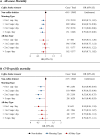Coffee drinking timing and mortality in US adults
- PMID: 39776171
- PMCID: PMC11843000
- DOI: 10.1093/eurheartj/ehae871
Coffee drinking timing and mortality in US adults
Abstract
Background and aims: To identify the patterns of coffee drinking timing in the US population and evaluate their associations with all-cause and cause-specific mortality.
Methods: This study included 40 725 adults from the National Health and Nutrition Examination Survey 1999-2018 who had complete information on dietary data and 1463 adults from the Women's and Men's Lifestyle Validation Study who had complete data on 7-day dietary record. Clustering analysis was used to identify patterns of coffee drinking timing.
Results: In this observational study, two distinct patterns of coffee drinking timing [morning type (36% of participants) and all-day-type patterns (14% of participants)] were identified in the National Health and Nutrition Examination Survey and were validated in the Women's and Men's Lifestyle Validation Study. During a median (interquartile range) follow-up of 9.8 (9.1) years, a total of 4295 all-cause deaths, 1268 cardiovascular disease deaths, and 934 cancer deaths were recorded. After adjustment for caffeinated and decaffeinated coffee intake amounts, sleep hours, and other confounders, the morning-type pattern, rather than the all-day-type pattern, was significantly associated with lower risks of all-cause (hazard ratio: .84; 95% confidential interval: .74-.95) and cardiovascular disease-specific (hazard ratio: .69; 95% confidential interval: .55-.87) mortality as compared with non-coffee drinking. Coffee drinking timing significantly modified the association between coffee intake amounts and all-cause mortality (P-interaction = .031); higher coffee intake amounts were significantly associated with a lower risk of all-cause mortality in participants with morning-type pattern but not in those with all-day-type pattern.
Conclusions: Drinking coffee in the morning may be more strongly associated with a lower risk of mortality than drinking coffee later in the day.
Keywords: All-cause mortality; CVD mortality; Coffee intake; Timing.
© The Author(s) 2025. Published by Oxford University Press on behalf of the European Society of Cardiology.
Figures




References
Publication types
MeSH terms
Substances
Grants and funding
LinkOut - more resources
Full Text Sources
Medical

